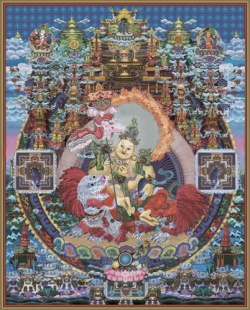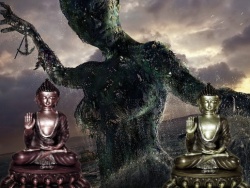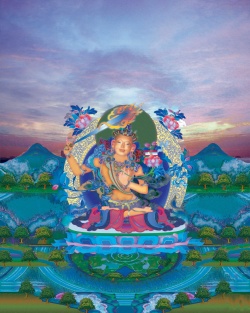Four reliances
The four reliances (Skt. catuḥpratisaraṇa; Tib. རྟོན་པ་བཞི་ tönpa shyi; Wyl. rton pa bzhi) —
- Rely on the message of the teacher, not on his personality (gang zag la mi rton/ chos la rton);
- Rely on the meaning, not just on the words (tshig la mi rton/ don la rton);
- Rely on the real meaning, not on the provisional one (drang don la mi rton/ nges don la rton);
- Rely on your wisdom mind, not on your ordinary, judgemental mind (rnam shes la mi rton/ ye shes la rton).
Commentary
Mipham Rinpoche says in The Sword of Wisdom:
- If you do not have such understanding,
- Then, like a blind man leaning on his staff,
- You can rely on fame, mere words or what is easy to understand,
- And go against the logic of the four reliances.
1. Do not rely on the individual, but on the Dharma
He also says in The Sword of Wisdom:
- Therefore do not rely on individuals,
- But rely upon the Dharma.
- Freedom comes from the genuine path that is taught,
- Not the one who teaches it.
- When the teachings are well presented,
- It does not matter what the speaker is like.
- Even the bliss-gone buddhas themselves
- Appear as butchers and such like to train disciples.
- If he contradicts the meaning of the Mahayana and so on,
- Then however eloquent a speaker may seem,
- He will bring you no benefit,
- Like a demon appearing in a buddha’s form.
2. Do not rely on the words, but on the meaning
Mipham Rinpoche says:
- Whenever you study or contemplate the Dharma,
- Rely not on the words, but on the meaning.
- If the meaning is understood, then regardless of the speaker’s style,
- There will be no conflict.
- When you have understood what it was
- The speaker intended to communicate,
- If you then continue to think about each word and expression,
- It is as if you’ve found your elephant but now go in search of its footprints.
- If you misinterpret what is said and then think of more words,
- You’ll never stop till you run out of thoughts,
- But all the while you’re only straying further and further from the meaning.
- Like children playing, you’ll only end up exhausted.
- Even for a single word like “and” or “but”,
- When taken out of context, there’s no end to what it might mean.
- Yet if you understand what is meant,
- Then with that the need for the word is finished.
- When the finger points to the moon,
- The childish will look at the finger itself.
- And fools attached to mere language,
- May think they’ve understood, but they will find it difficult.
3. Do not rely on the provisional meaning, but on the definitive meaning
Mipham Rinpoche says:
- When it comes to the meaning,
- You should know what is provisional and what is definitive,
- And rely not on any provisional meaning,
- But only on the meaning that is true definitively.
- The omniscient one himself in all his wisdom,
- Taught according to students’ capacities and intentions,
- Presenting vehicles of various levels
- Just like the rungs of a ladder.
- Wisely, he spoke with certain intentions in mind,
- As with the eight kinds of implied and indirect teachings.
- If these were to be taken literally they might be invalidated,
- But they were taught for specific reasons.
4. Do not rely on the ordinary mind, but rely on wisdom
Mipham Rinpoche says:
- When taking the definitive meaning into experience,
- Do not rely upon the ordinary dualistic mind
- That chases after words and concepts,
- But rely upon non-dual wisdom itself.
- That which operates with conceptual ideas
- Is the ordinary mind, whose nature involves perceiver and perceived.
- All that is conceived in this way is false
- And will never touch upon the actual nature of reality.
- Any idea of real or unreal, both or neither—
- Any such concept, however it’s conceived—is still only a concept,
- And whatever ideas we hold in mind,
- They are still within the domain of Mara.
- This has been stated in the sutras.
- It is not by any assertion or denial
- That we will put an end to concepts.
- But once we see without rejecting or affirming, there is freedom.
- Although it is without any subject-object grasping,
- There is naturally occurring wisdom that illuminates itself,
- And all ideas of existence, non-existence, both and neither have ceased completely—
- This is said to be supreme primordial wisdom.
The definitive meaning can either be understood conceptually, by means of ideas, or it can be experienced directly as the object of non-conceptual awareness wisdom. As long as you are caught up in the conceptual extremes of negation and affirmation, existence and non-existence and so on, you have not gone beyond the realm of the ordinary mind. When you arrive at the sublime experience of wisdom, and all dualistic ideas have been pacified, you are in harmony with the nature of reality, which is beyond any kind of refutation and establishment or denial and affirmation, and you have reached the true depths of the Dharma.
Alternative Translations
Further Reading
- Sogyal Rinpoche, The Tibetan Book of Living and Dying, page 134.
- Dzogchen Ponlop, Rebel Buddha (Boston: Shambhala, 2010), pages 165-168.






